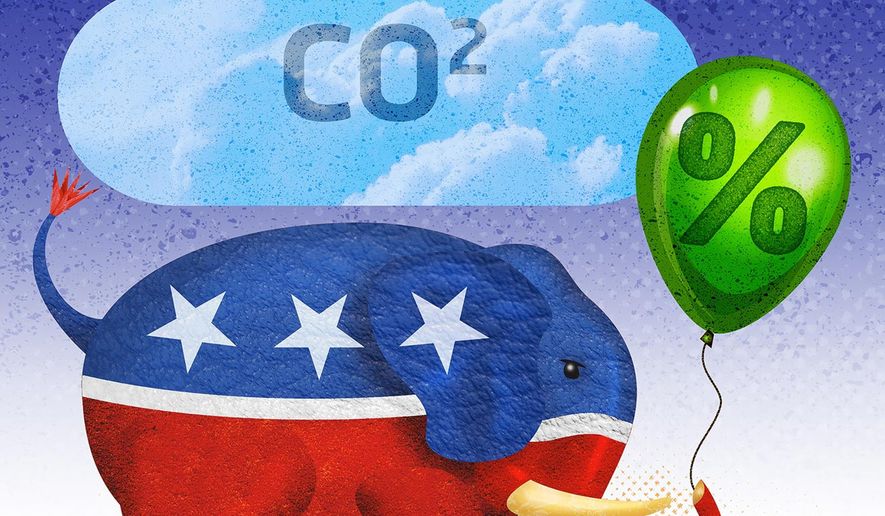OPINION:
Two Senate Republicans — Kevin Cramer of North Dakota and Bill Cassidy of Louisiana — seem to be taking West Virginia Sen. Joe Manchin III’s latest legislative effort as a moment to advocate for higher energy taxes for consumers.
That sounds crazy, right? Who would want to increase the price of energy when oil and natural gas prices are two or three times as much as they were a year ago and especially when they show no sign of abating?
It turns out these senators favor something called a carbon border adjustment tax. It is actually a pretty simple mechanism. If the United States imports energy that has the potential to create greater emissions of greenhouse gases like carbon dioxide than our own domestic energy, a tax would be imposed on those imports.
The same mechanism works for finished goods. If their manufacture results in higher levels of greenhouse gases, a tax that attempts to capture the value of the difference in greenhouse gases emitted would be imposed on the goods.
There are, obviously, a couple of problems with this idea.
First, and most destructively, it creates a backdoor tax on energy. Everything made, everything transported and everything that keeps people warm or provides electricity invariably involves the use of natural gas, oil or coal. No matter where or when it is imposed, a “carbon dioxide” tax is a tax on energy.
Make no mistake. Consumers will pay this tax; businesses will just pass along the cost. Second, as a practical and legal matter, an import tax on carbon dioxide would require the U.S. to impose a tax on our own domestically produced energy and goods. Trade agreements are going to preclude us from pulling a number out of thin air. This is, of course, the real goal of the enterprise — to impose an energy tax on the American economy by whatever means.
Third, like all energy taxes everywhere, such an import tax would be regressive, falling hardest on those least able to afford to it — the poor, the elderly, those on fixed incomes and local institutions such as schools and hospitals.
For example, we export some of the fertilizer we use to grow food in the United States. Fertilizer uses natural gas as feedstock. Unfortunately for consumers, fertilizer prices are already sky high, and this proposed tax would drive them higher. That means higher food costs for all Americans, and those who are struggling now would be least able to bear the additional burden.
This is not a small matter. The United States imports about 8 million barrels of oil per day. Almost all of that would be subject to this proposed tax. We import more than $3 trillion of goods each year, much of which also would be subject to such a tax.
Such a tax would not affect the trajectory of global warming at all. But it would get the federal government even more involved in the American economy, and it would make everything that is made possible by energy — so, essentially everything in a modern economy — more expensive.
Keep in mind, all of this is being considered against the backdrop of the highest energy prices in years and the worst inflation in more than four decades.
Maybe Mr. Cramer and Mr. Cassidy would be interested in the results of a nationwide survey MWR Strategies, in concert with the Committee to Unleash Prosperity, conducted in February. The findings can be summarized as follows: Republicans continue to be on solid ground with respect to climate change.
Voters continue to prefer making their own decisions (rather than handing them over to the government). They continue to rank climate change at or near the bottom of their priorities. They continue to be unwilling to pay anything more than a de minimis amount to address climate change (and a durable plurality are unwilling to pay anything). Voters are even clear on the fundamentals of the science — by a margin of 24 points, respondents identified carbon dioxide as “needed for plant life” rather than a “pollutant.”
When asked about a tax on carbon dioxide, voters rejected it by a margin of 40 points (63-23).
All of this comes in the wake of the Business Roundtable, the Chamber of Commerce and the American Petroleum Institute supporting new energy taxes. As disturbing as those efforts are (who intentionally damages their own customers?), this new idea is worse. At least some in the business community have been obvious about their politically transactional interest in increasing energy prices in exchange for some very transitory goodwill from the environmental community.
In this instance, it appears as if Mr. Cramer and Mr. Cassidy are in favor of increasing energy prices for no particular reason at all. Maybe voters in North Dakota and Louisiana are different from other Americans and are demanding higher energy taxes. Maybe they aren’t.
• Michael McKenna is a columnist for The Washington Times and co-host of “The Unregulated” podcast. He was most recently a deputy assistant to the president and deputy director of the Office of Legislative Affairs at the White House.




Please read our comment policy before commenting.